天吐喀伊
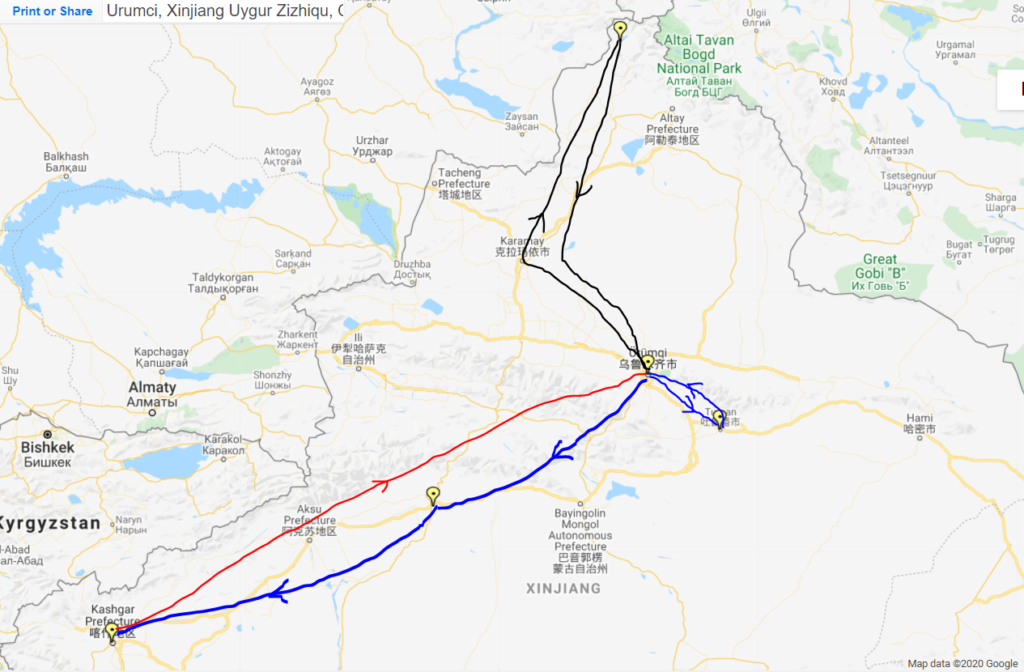
Urumqi-Kucha -kashgar-turpan
Starting with a flight from Singapore to Urumqi that included a short layover in Chongqing, China, destinations within Xinjiang Province were reached by the following means of transport:
Black: Bus Blue: Train Red: Flight
Singapore – Chongqing, China
China West Air PN6358
Departure from Singapore: 0035hr
Arrival at Chongqing: 0530hr
The flight to Urumqi from Singapore’s Changi International Airport on West Air was 11 hours split into two legs, with a stopover at China’s Chongqing Jiangbei Airport before dawn. I had previously searched for a companion online to explore Xinjiang together and my family and I met Christine* at Changi International Airport’s Terminal 2 at about 2200, ahead of the scheduled departure time of 0035hr. Christine will be my companion for our two weeks in Xinjiang after which she will return back to Singapore whilst I continue on my overland journey towards Singapore.
With my plan to travel back to Singapore by land over the next 48 days, I had a one-way ticket to Xinjiang in hand. I was about to face my very first potential obstacle. Weeks ago, I had read up blogs detailing horror stories of travellers with one way tickets being forced to purchase a return air ticket during the check-in process. Such was explained as a preventive measure – airlines would not want to be responsible for flying one back home if one was caught overstaying in the host country one flew to. Whilst it is commonly understood that any proof of leaving the host country would technically suffice (by international train, boat etc.), it seemed that certain airlines required proof of return flights.
Nanning – Hanoi International train ticket purchased as proof of exit from China.
With no prior experience of West Air check-in procedures, I paid and saved a phone screenshot of an online receipt for an international train ticket from Nanning (Guangxi Province, Southern China) to Hanoi (Northern Vietnam) which I hoped would suffice as proof of leaving China before my Visa expires. I had also came prepared with an open browser which listed the cheapest flights out of China which I will use to purchase that cheapest flight ticket if made to do so.
I was a bag of nerves within as I presented my one way itinerary at the check in counter. The service staff at West Air issued me a boarding pass without question and we made it to the boarding gate for our first leg of the journey towards Xinjiang. Immediately whilst we were still on ground with mobile data connection, I refunded my international train ticket from Nanning to Hanoi.
Refund proof of Nanning – Hanoi International train ticket. The intention for this ticket purchase was to show evidence of exit from China before my Visa expiry date. Purchased from ChinaTicketOnline.com, this international train ticket’s price was cheaper than an air ticket out of China.
With China conveniently sharing borders with Laos, Myanmar and Vietnam, the main reason for the refund was because my plan was to head towards Laos from China this time, instead of Vietnam.
Take off from Changi International Airport at 0035hr.
West Air is a budget airline, thus the lack of in-flight complimentary meals and entertainment were expected. However, the seats did not recline at all, in the 5 hours of flight time we sat uncomfortably stiff and upright and were glad to land at Chongqing Jiangbei Airport at around 0530 the next day. Upon arrival, we were immediately greeted by ground staff who came to guide transiting passengers through the hour and a half transit process. There were only about ten passengers from our West Air PN6358 flight who were continuing our journey towards Urumqi. Although we hardly slept that on the flight from Singapore, we felt so much at ease when we realized that we were being accompanied throughout the entire process of navigating the vast airport to retrieve, check in our backpacks and receive our transit boarding passes. There was no need to figure out where to go.
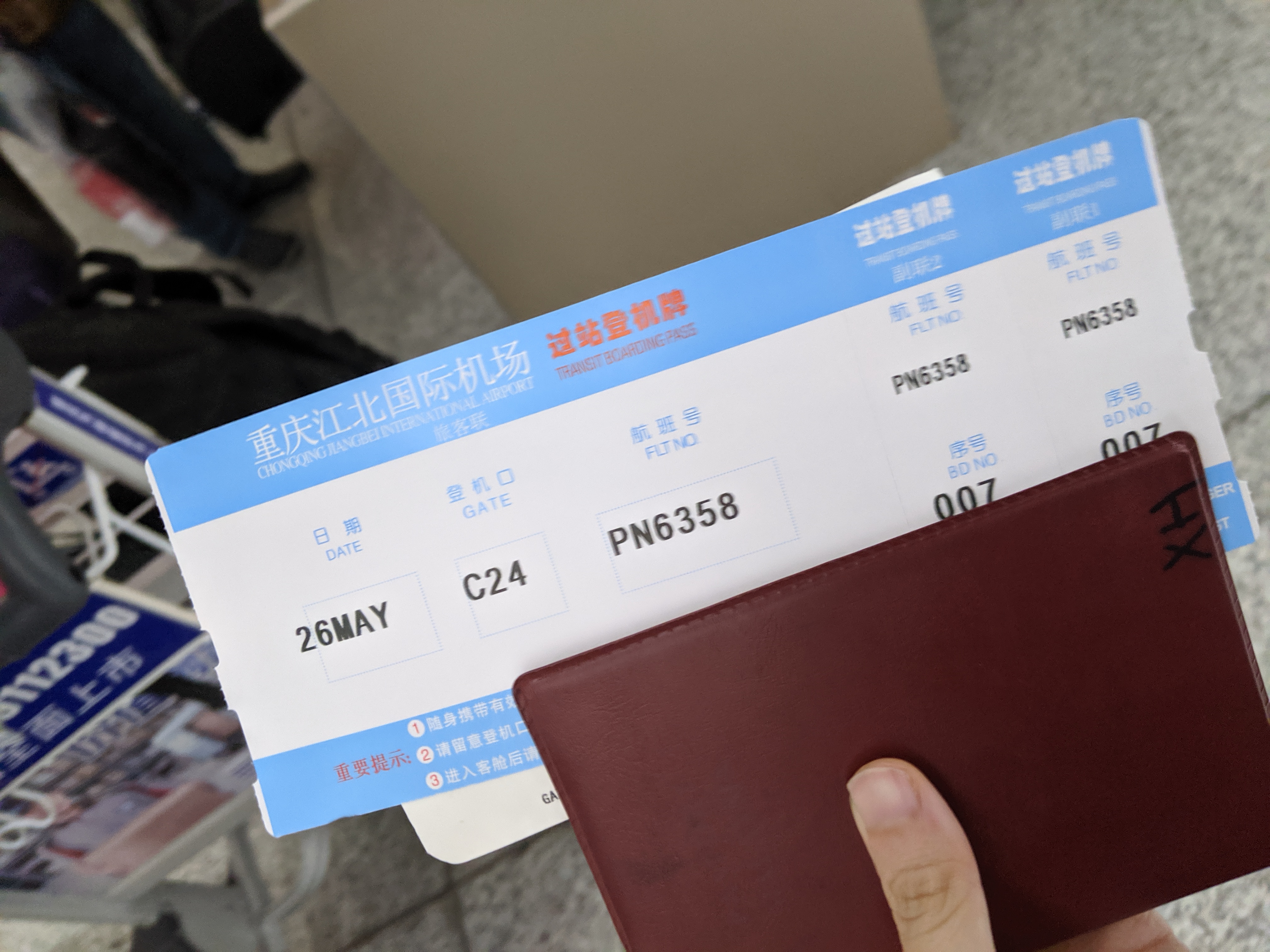
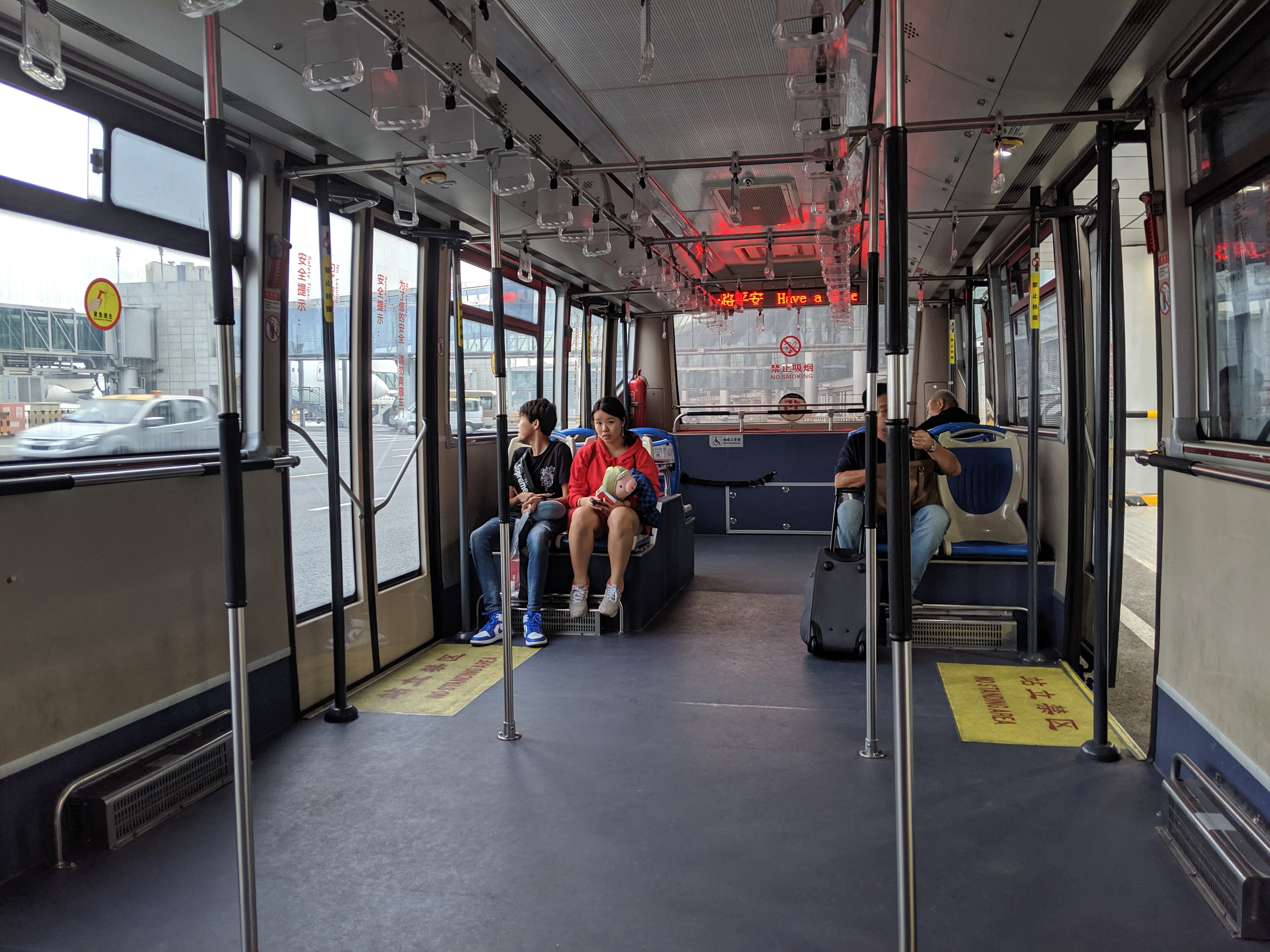
Transiting at Chongqing Jiangbei International Airport. Left Image: Transit ticket. Middle Image: The view beyond the departure gate at 0630hr. Right Image: Internal shuttle ride from departure gate to our second West Air jet.
After about forty minutes, we stood at the departure gates, waiting for an airport shuttle to ferry us to our second West Air jet. Interestingly, the vehicle number was still PN6358 yet this second West Air jet to Urumqi had reclining seats which was a great relief for a quick snooze as dawn broke in the skies. Both take-off and landings with West Air were considerably smooth and I personally would take it again for its value and relatively low price point.
About half an hour to landing. Those snow capped peaks idyllically scream Northern China!
Chongqing, China – Urumqi, China
China West Air PN6358
Departure from Chongqing: 0706hr
Arrival in Urumqi: 1055hr
Upon landing in Urumqi, my first task was to buy a local SIM card. Christine had previously subscribed to our overseas data roaming data plan back home and was able to use internet services in Urumqi even though its processing speed had slowed down considerably. Urumqi Diwopu International Airport seemed to be designed with the idea of efficiency as transfer hub at its core, the number of shops and facilities around were sparse, there simply wasn’t any local SIM around for sale. Strange, as I had always been able to get a local SIM in the mainland effortlessly and the airport has always been an ideal place to settle any issues of communication and internet access in the following days of travel. Believing that I would be able to find a local SIM later in town, we headed for our accomodation in a cab. Cab fares in Urumqi City start at 10 yuan for rides within 3KM of Urumqi.
There was another obstacle. My personal phone is a Google Pixel and with regards to the recent ban on Google services in Mainland China, I certainly did not expect my Google applications to work there. However, I was horrified when I realized that my Google Phone appeared to be non-functional within the mainland. That meant that I had no access to local WIFI or hotspots. Any attempt to connect would render a “Connected, no internet” notification. No sweat, I had with me another spare OPPO phone which allowed instant access to local WIFI services, albeit only available at hotels. I could still continue communicating with my family and access the internet with my spare OPPO phone. Meanwhile, my Google Phone was reduced to a mere photo and note taking device during my time in China.
Little did I know, my spare OPPO phone would later give way two weeks later.
Taxi from Urumqi Diwopu International Airport towards the City. 1155hr.
After checking into our accomodation, we searched around a nearby shopping mall for lunch. There didn’t seem to be many budget options and our stomachs were growling so we settled for a canteen looking area where customers could order from any of the surrounding stores.
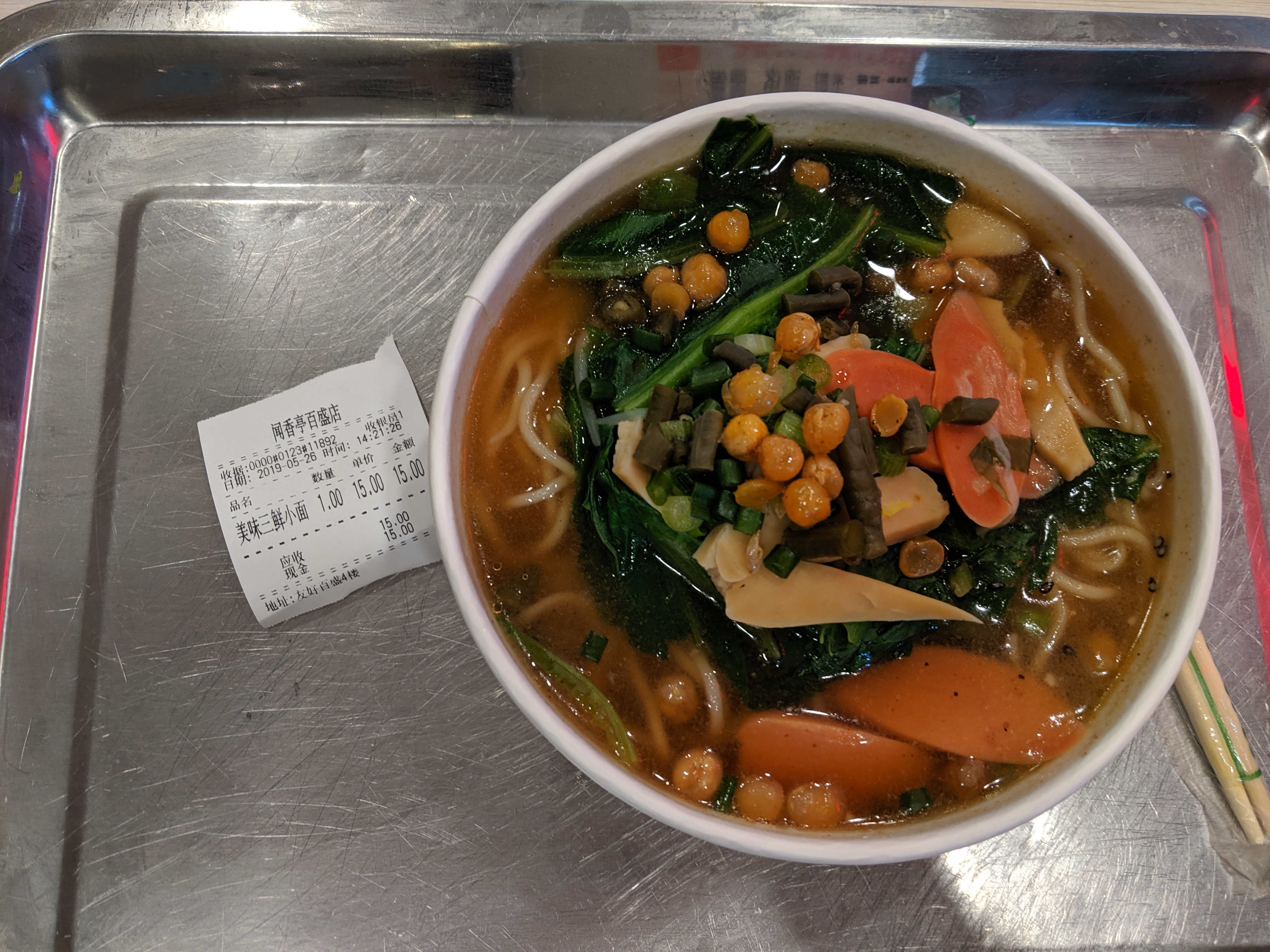
Noodles for lunch. You Hao Bai Sheng Building, 4th floor (友好百盛4楼). 15 Yuan. 1421hr.
As I still craved the convenience of being able to access to the internet whenever we are out, the hunt for a local SIM was on after lunch. There was time to do so as we had planned a leisurely day after our tiring flight, with the only plan for the day happening only later that evening where we would explore Urumqi’s Grand Mosque and Grand International Bazaar. I tried my luck at three of China’s biggest mobile operators; China Mobile, China Telecom and China Unicom. The response I received was nothing short of strange. Upon hearing that I was intending to use a passport to register and purchase a local SIM card, the shop assistants would politely reject my request and direct us to another shop, promising us better luck there. In and out of tens of shops we went on a wild goose chase before it dawned on me that no one is going to sell me a local SIM card in the whole province of Xinjiang.
I was informed that the purchase system has already changed. Instead of being able to simply purchase a local SIM like I used to in Mainland China, a Chinese identity card is required for local SIM registration (实名制). Foreigners are not allowed to purchase a Chinese mobile number unless a local is willing to register your phone number under their name. Such would place these individuals under certain risks, thus it was almost impossible to find someone willing to help. Perhalps this was solely due to the stricter regulations in Xinjiang and I geared myself up for the inconveniences that would come with the lack of internet access outside for the rest of my two weeks in this province. Fortunately, there was Christine’s data roaming connection to rely on in any case we were lost and as our plan for our time in Xinjiang was relatively detailed, with tickets at major connection points within Xinjiang already paid for, we did not require the internet for important bookings. Still at the back of my mind, there was the nagging fear of not being able to purchase a local SIM card when I travelled to the other Chinese provinces in two weeks time without Christine.we are
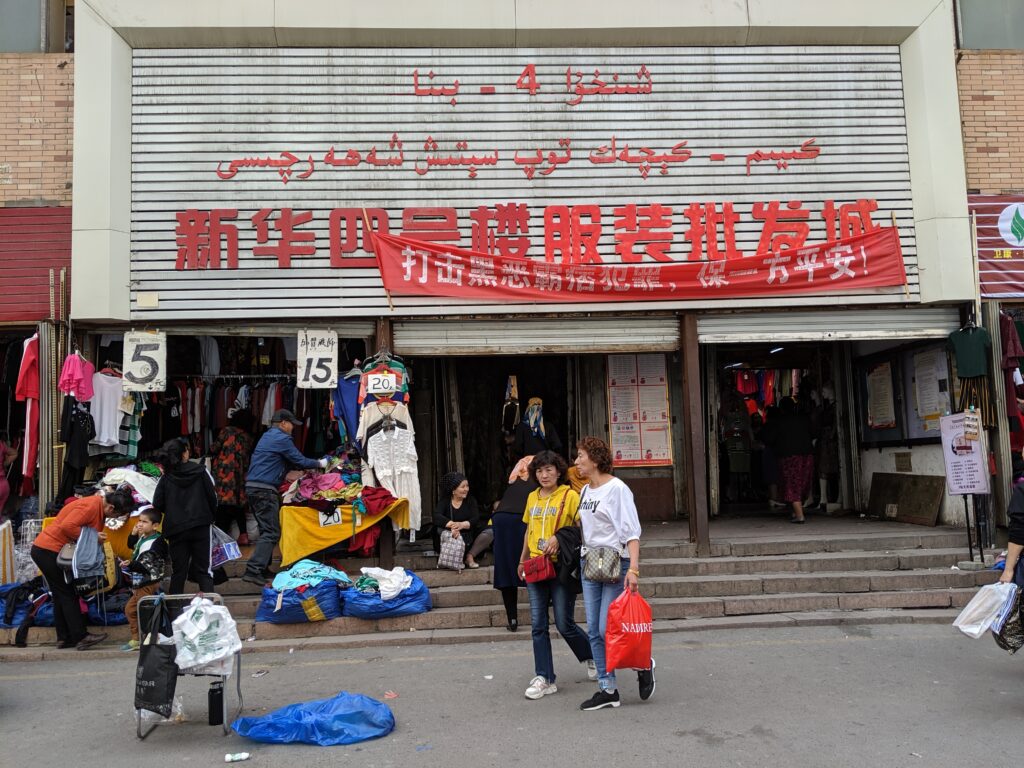
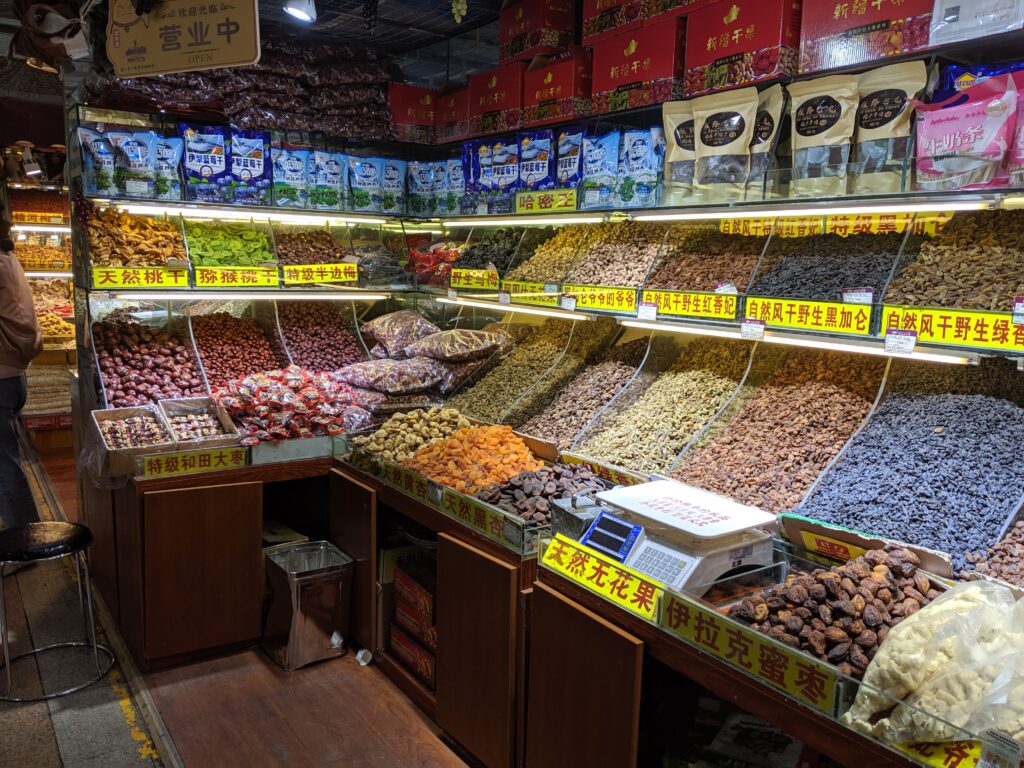
Left image: Most, if not all clothes were sold as sets. Right image: Free tasting of dried goods at the supermarkets. No hard selling involved!
No local SIM? Worry about that later, there’s so much to feast our eyes upon. Just the mouth-watering array of dried goods, candies and clothing there were so many unusual goods calling for our attention from every direction! Urumqi in the summer was one of a kind where everyone seemed out till late as the sun only sets at 2100hr local time. We walked and shopped amongst the crowd well into the night with the sun still high in the sky. Prices were observed to be a little on the high side compared to other Chinese provinces, with a main dish costing no less than 10 yuan. Security was everywhere, at schools, markets and shopping centres were barricaded with automated security gates and bag checks. Police frequently patrol the streets and guarded areas where crowds gathered. We passed a kindergarten where there were kids performing within the school compound, it was their Graduation Show Day and the area was condoned off and guarded by about ten uniformed police who distanced themselves along the perimeter of the school grounds. Everything seemed systematic and orderly and we moved without fear. Interestingly, to prevent theft in supermarkets, all carry on items will be sealed in a cotton bag upon entry which would subsequently be unlocked by the cashier when we make payments. Some stores for example the famous Chinese discount chain Huohuli (火狐狸批发城 ) requests for customers to leave all bags with security which was understandable but made us uncomfortable, we left after looking longingly at all its discount signs.
There was an overwhelming sense of generousity with the store owners’ smiles and samples, I felt as if I could sample almost everything and there will be no one would to stop me as they believed customers would not take more than necessary. They even allowed photos, with genuine smiles even if you decide not to buy anything after it all.
Later that day, we were finding our way around and became stranded under a flyover. As we had a destination in mind, we held out hands out expecting to flag down a cab but were instead, picked up by a private hire driver. As there were two of us and another lady customer in his front seat, we decidedly boarded. The experience was smooth but not without risks for although the cost was significantly cheaper than cabbing, there was no say on whether roadside private hires were illegal or not. “It’s all up to your discernment.” our private hire driver answered. For subsequent rides around the city, we hailed cabs with each ride costing around 10 yuan. Most, if not all cab drivers in Urumqi are Chinese. We managed to strike a conversation with one who had previously worked as a teacher in his native Gansu province. He shared that he had earned around 4000 yuan as the lead of a team of teachers (领导) which was incomparable to the 6000-7000 yuan he currently earns as a cab driver in Urumqi. Majority of these Chinese cab drivers in Xinjiang typically hail from the neighbouring Chinese provinces of Gansu and Henan.
There were no prayer calls from the Grand Mosque throughout that day. Our stay in Xinjiang coincided with the period of Ramandan (5 May – 4 June 2019), where the Uighyurs would supposedly observe fast (斋月). The city seemed as per normal during the fasting period, government offices closed at around 1630hr and shops were open till the sun sets at around 2100hr. It was our first day and the genuinity of the local made already made a favourable impression on us. There was no attempt to hard sell, the stall owners and supermarket assistants were generous with their smiles and samples.
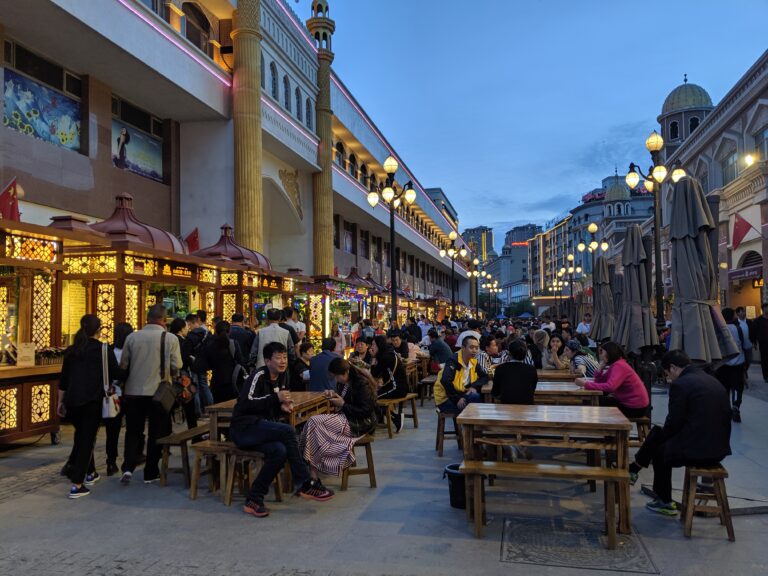
Our dinner on this first day was settled at a local fast food chain. Albaik is a Uighur fast food chain, found only within Xinjiang. Pronounced in two syllabi “Aisle-Beak”, it serves pizza, cakes and noodle sets in addition to the regular portions of fried chicken, fries and soft drinks typical of fast food restaurants. Albaik fries are unsalted by default and their taste is no doubt better than fries from McDonalds.
Back at our accomodation that night, the WIFI failed to work on our phones, including my OPPO spare. Approaching the front desk for help wasn’t an option, they sent up a Chinese security guard who stood at our door for an hour trying to figure out why our phones could not connect to the accomodation’s WIFI. His phone had no problems connecting. We were left with the option of using Christina’s roaming data to access the internet. By logging into my Ctrip account on her phone, I booked us on a one day tour to Xinjiang’s famed Heavenly Lake for the next day.
